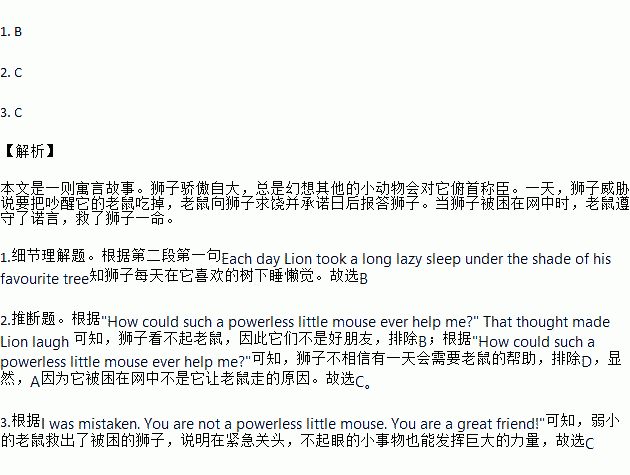题目内容
More than anything else in the world, Lion liked being King of the jungle(丛林).He walked around, showing off his power and pride.
Each day Lion took a long lazy sleep under the shade of his favourite tree. He always dreamed of weaker animals bowing(鞠躬)before him.
One day Mouse ran through the jungle and tripped over Lion's huge paws. Lion woke up with a start. "How dare you wake me up! " he shouted angrily. Lion hunted Mouse with one paw. "On the second thought, I'm in the mood for the snack, and you'll make a delicious meal." he said.
Mouse cried out, "King Lion, please spare me! If you let me live, I'll always remember your kindness. And, some day, I might be able to help you."
"How could such a powerless little mouse ever help me?" That thought made Lion laugh so much that he decided to let Mouse go. A week later, Lion was walking through the jungle on the
way to his favourite tree when he stepped onto a hunter's net. The net scooped(兜接)him up. No matter how he twisted and turned, he couldn't run away.
When Mouse heard Lion's frightened shouts, he raced to help. Mouse quickly chewed(咀嚼) through the ropes to make a hole in the net. Soon, Lion moved out and was free. Lion looked down at the little mouse."Thank you for saving my life," said Lion ,smiling his widest smile," I was mistaken. You are not a powerless little mouse. You are a great friend!"
1.What did Lion do each day?
A. He showed kindness to animals in the jungle.
B. He had a good sleep under his favourite tree.
C. He bowed before weaker animals.
D. He stepped onto a hunter's net.
2.Why did Lion let Mouse go?
A. Because he was trapped in the net.
B. Because he took Mouse as his good friend.
C. Because he doubted if Mouse could be of any help.
D. Because he believed Mouse could save him.
3.What can we learn from the passage?
A. Pride makes you lose what you have.
B. Don't put all your eggs in one basket.
C. Even the small can show great strength.
D. When the cat's away, the mice will play.

